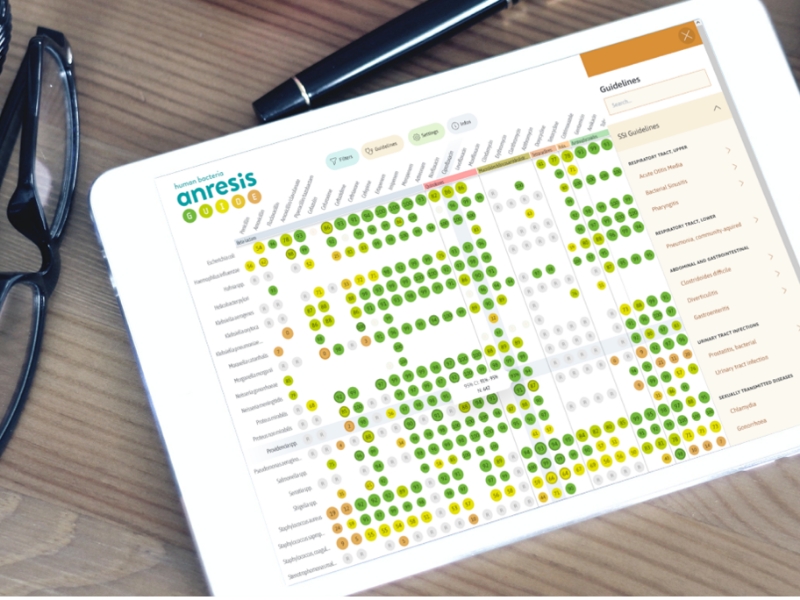Antibiotic resistance
Overview of antibiotic resistance in India with Bern-based tool
India is facing high levels of antibiotic resistance. A tool further developed by the University of Bern together with an Indian university now offers insights into resistance patterns in northern and western India, laying the groundwork for improved awareness.

Whether through the skin, the respiratory tract or via contaminated food: Bacterial pathogens can enter the human body through various routes. A growing number of bacteria are developing resistance, rendering antibiotics ineffective. These so-called antimicrobial resistances (AMR) are threatening to undo decades of medical advancements.
Data for smart use of antibiotics
Monitoring resistance patterns is crucial to curbing the rise of resistant bacteria. The Swiss Centre for Antibiotic Resistance ANRESIS, which is affiliated with the University of Bern, manages this task in Switzerland on behalf of the Federal Office of Public Health. Understanding local resistance trends helps healthcare professionals use antibiotics judiciously, following the "use wisely" principle. The key idea is: “as much as necessary, as little as possible”.
“ANRESIS’ central concern is to collect the resistance data, and also present it clearly and intuitively to all interested parties,” says ANRESIS project manager Andreas Kronenberg. The ANRESIS Guide, developed in 2023, offers such a presentation. The web-based tool displays a color-coded matrix that illustrates how different bacteria react to various antibiotics.
India as a hotspot for resistance development
India is one of the global hotspots for antibiotic resistance, with significantly higher resistance rates than Switzerland. “The main reason is the widespread use of antibiotics in both human medicine and agriculture. In India, antibiotics are available over the counter and are often misused,” explains Kronenberg. Poor hygiene, close human-animal contact, and often inadequate healthcare provisions further promote the spread of resistant infections, complicating treatment. The result is a higher mortality rate from AMR-related bacterial infections.
ANRESIS Guide for India
Through the Swissnex network, in collaboration with Ashoka University in Haryana, India, an Indian version of the ANRESIS Guide (ANRESIS Guide India) has now been developed. Shraddha Karve, a research fellow at Ashoka University and co-initiator of the project, notes, “While government agencies, NGOs, and private companies are ramping up AMR surveillance in India, not all information is freely and quickly accessible”. The ANRESIS Guide India provides healthcare professionals with a clear overview of resistance patterns in northern and western India for the first time. Shradda Karve is optimistic, “Even infection control teams at larger healthcare facilities will benefit from this data as it covers a broader population”. While the tool may not immediately change prescribing practices in India, it could raise awareness about the responsible use of antibiotics.
Due to increasing global mobility and migration, countries like Switzerland are also affected by resistance issues in India. “By 2050, over 8 million deaths worldwide could be attributed to AMR,” says Kronenberg. To raise awareness among the public and policymakers, the international Antimicrobial Resistance Awareness Week will be held from November 18 to 24. “I hope the Indian version of ANRESIS will also strengthen global surveillance efforts by providing realtime data from India,” Karve concludes.
About the person

Andreas Kronenberg is a general practitioner and professor at the Institute for Infectious Diseases (IFIK) at the University of Bern. He leads ANRESIS, the Swiss Centre for Antibiotic Resistance, which operates on behalf of the Federal Office of Public Health.
About the person

Shraddha Karve is a research fellow at Ashoka University in Haryana, India. She works on data-driven public health projects, currently focusing on the pressing issue of antimicrobial resistance in India.
Raising awareness and education with the ANRESIS Guide
Resistance data in the ANRESIS Guide is collected across Switzerland and updated quarterly. In addition, practicing physicians can find the current antibiotic guidelines of the Swiss Society for Infectious Diseases in the ANRESIS Guide. Swiss hospitals or hospital groups can also incorporate their own guidelines, as Chur Hospital has now done (ANRESIS Guide Cantonal Hospital Graubünden). This provides doctors with comprehensive information to help them make decisions when prescribing antibiotics. For students, the tool includes theoretical content on microorganisms and antibiotics, developed in collaboration with the University of Bern and pharmaSuisse. This helps future doctors become familiar with the resistance issue early and equips them to work effectively with current data.
Further information:
World Antibiotics Resistance Awareness Week
National Strategy on Antibiotic Resistance Switzerland (StAR)
Subscribe to the uniAKTUELL newsletter

Discover stories about the research at the University of Bern and the people behind it.